Russian oligarch Gennady Timchenko is reportedly selling his shares in Stroygaztrans to another engineering company ARKS, which may be involved in construction of the Kerch Bridge.
Welcome to our column, Russia Update, where we will be closely following day-to-day developments in Russia, including the Russian government’s foreign and domestic policies.
The previous issue is here.
UPDATES BELOW
Russia This Week:
– What Happened to the Slow-Moving Coup?
– Can We Be Satisfied with the Theory That Kadyrov Killed Nemtsov?
– All the Strange Things Going On in Moscow
– Remembering Boris Nemtsov, Insider and Outsider (1959-2015)
Special features:
– Alexey Navalny On the Murder of Boris Nemtsov
– Theories about Possible Perpetrators of the Murder of Boris Nemtsov
– Novaya Gazeta Releases Sensational Kremlin Memo
Please help The Interpreter to continue providing this valuable information service by making a donation towards our costsâ€.
A new movie called Prezident, devoted to the anniversary of President Vladimir Putin’s 15 years in office, while mainly a set propaganda piece, has yielded a few revelations that are being discussed by the Russian media.
In the interview, TASS reports that Putin says he can “quite imagine life outside this post,” and said the question was even “a litmus test.”
“If a person cannot return to an ordinary apartment and live there, and not simply exist in palace interests, then I consider that he hasn’t lost touch with the outside world.”
Quite a few people believe Putin does not live in the real world, whether Chancellor Angela Merkel, who has commented about Putin’s “other world” in his tendentious interpretation of events in Ukraine, to the ex-pat British dairy farmer John, who asked Putin during his call-in show whether he believed the fake statistics of his own bureaucracy.
There has been much speculation about an impressive establishment dubbed “Putin’s Palace” in Gelendzhik on the Black Sea coast of Russia which was built by businessman close to Putin.
Even if Putin is forced finally to concede that he must leave office, with the personal wealth he has said to have amassed of at least $40 billion, and his extensive contacts among the siloviki or power ministries, he would likely to continue to have an outsized influence on Russian affairs and would be shielded from much of its reality.
Putin’s rating has climbed continually to 1.5 times what it was in 2000, says TASS. It reached a high of 88% last month, hardly dipping in the last year since the invasion of Crimea, some wonder if his glorification of 15 years indicates insecurity.
Putin precedes a brief section on the opposition with a story of how he flew with the cranes, and got some of the reluctant ones to fly with him, but some just wouldn’t go with the flock. A journalist mentions a humorous piece by talk show host Kseniya Sobchak who said only 63% flew with Putin and the others didn’t. Putin fired back that only the weaker birds didn’t fly with him, but on his second try, most of them did follow him. A few remained in their nests. Nevertheless, these obstinate birds had to be treated “as part of our population” and “cared for,” he said.
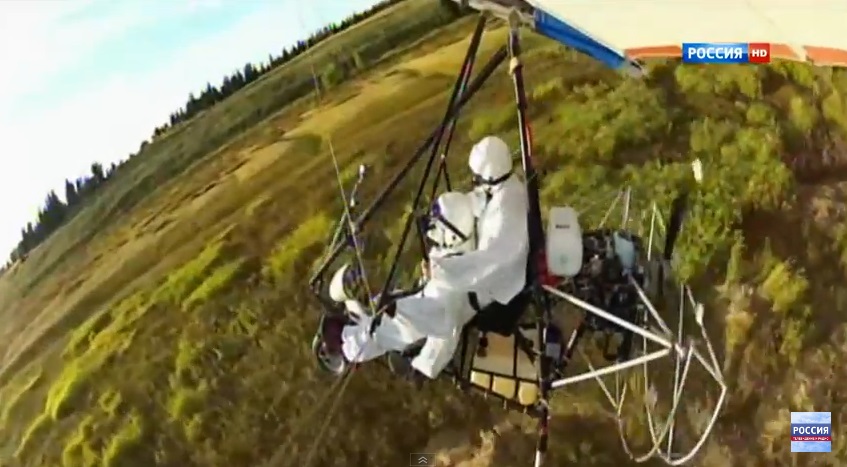
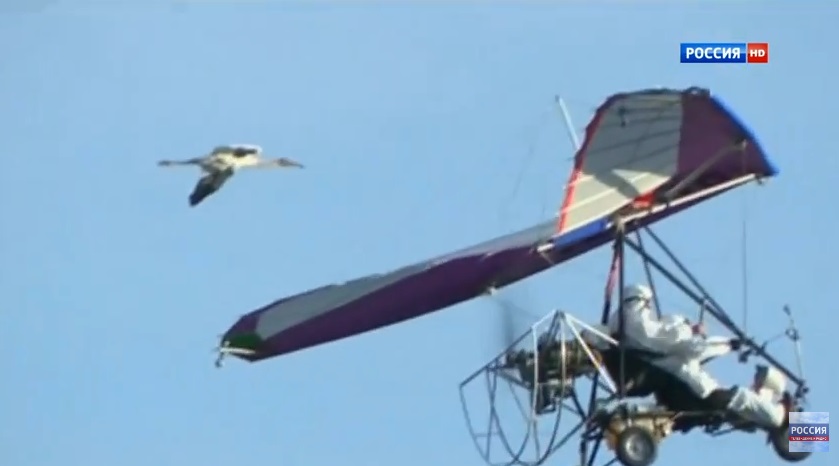
Then the camera cuts to Kremlin spokesman Dmitry Peskov, who described the “implacable, aggressive position” figures in opposition took to Putin, specifically mentioning oligarchs Boris Berezovsky and Mikhail Khodorokovsky.
A telling anecdote in the film is Putin’s account of how he faced resistance in 1999 when he was prime minister and President Boris Yeltsin planned to make him his successor. Without naming any names, he described meeting with a group of hostile oligarchs:
“Some of them, when I was chairman of the government [prime minister] and when [first RF president Bors] Yeltsin announced that I would run as president came to me in my office in the White House, sat down across from me and said, ‘Well, you understand, you will never be president here ever.’
Putin replied, “Well, we’ll see.” Asked how he managed to deal with the oligarchs, Putin replied curtly, “In different ways. With different means.”
Peskov praised Putin for treating his opposition “humanely” by magnanimously inviting Berezovsky, who lived in exile, to return to Russia as he had “admitted his mistakes,” and by allowing Khodorkovsky, near the end of his prison term to be pardoned and released to visit his ailing mother, who later died.
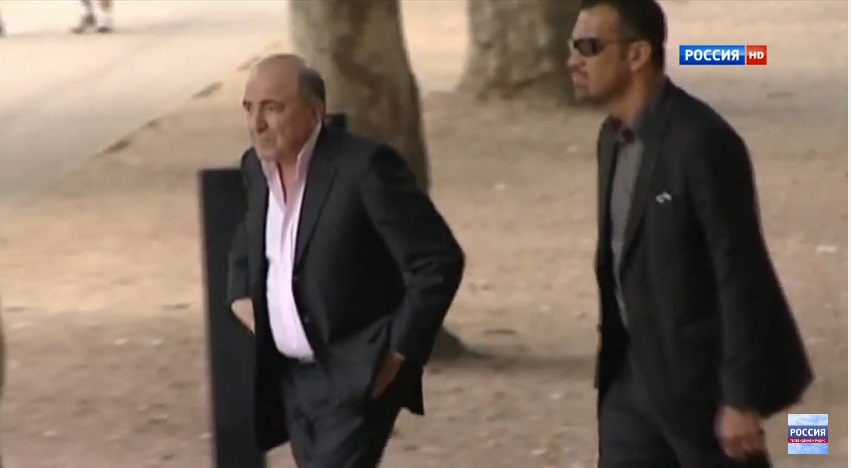
Boris Berezovsky
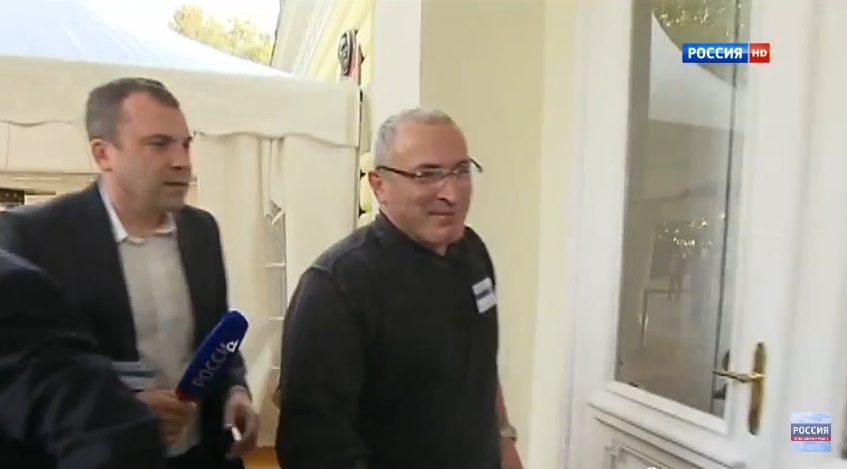
Mikhail Khodorkovsky (R)
Putin was confronted by journalist Aleksandr Yunashev challenging him as to why he freed Khodorkovsky when he began opposition work soon after his release. Putin says it was out of “humaneness,” although the film-maker fails to mention that Khodorkovsky cannot return to Russia because he cannot get a guarantee that he will be free to come and go. And Berezovsky
committed suicide before his return became possible.
Footage is included of the anti-Putin “white ribbon” demonstrations of 2011, but the focus is on some scenes of demonstrators pushing police, without commenting on the police who beat demonstrators shown as well.
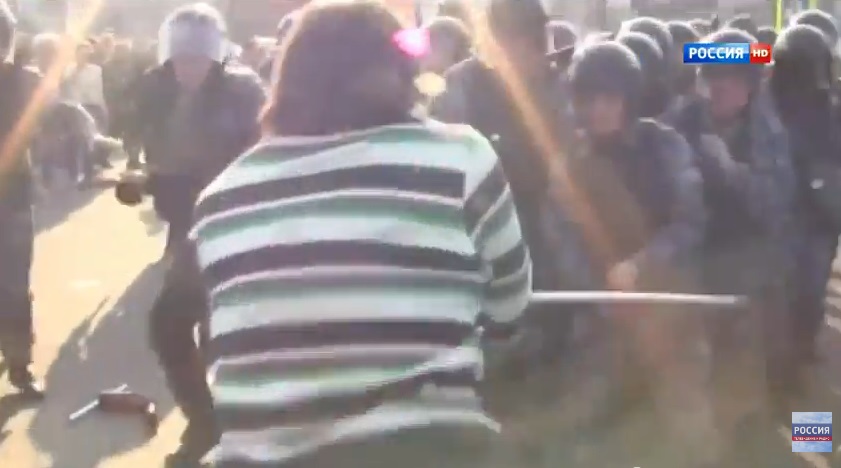
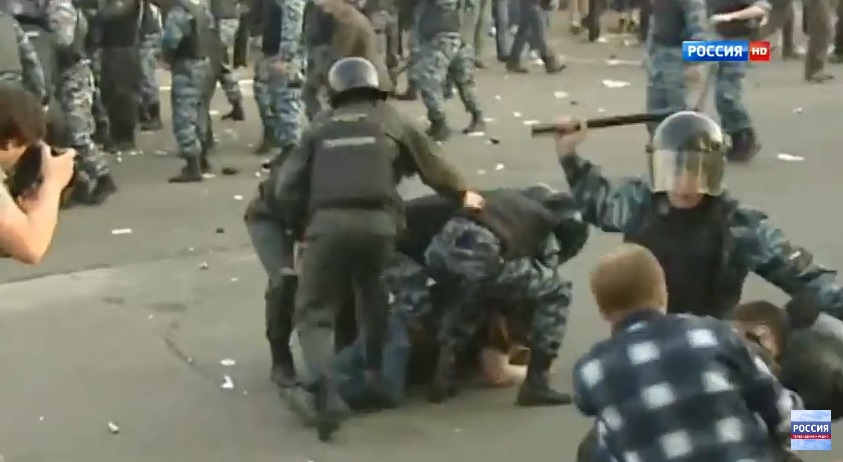
Bolotnaya Square demonstrations May 6, 2012
Former finance minister Aleksei Kudrin, who took part in the protests, said that they merged with extremists and nationalists and therefore Putin could not find an interlocutor for dialogue.
Scenes follows of ultranationalists:
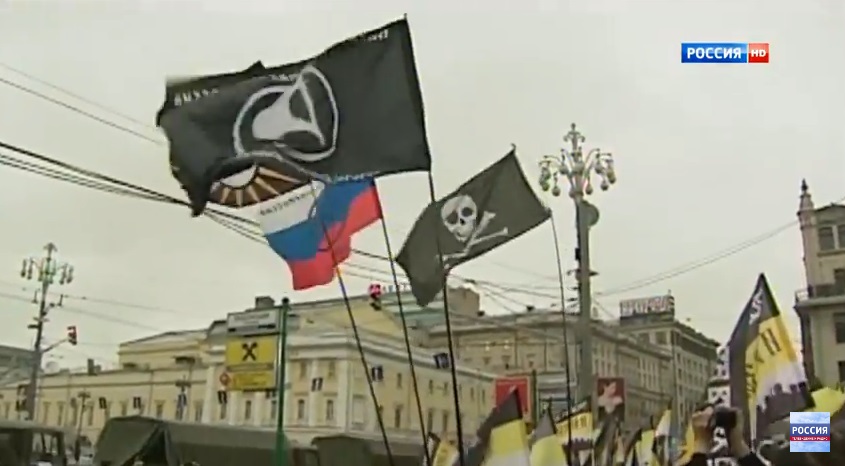
In fact, Kudrin appears so many times in the video, with the title “Committee for Civic Initiatives” and describing himself as trying to bring the opposition and Putin together, that one wonders if he is being groomed for some new post.
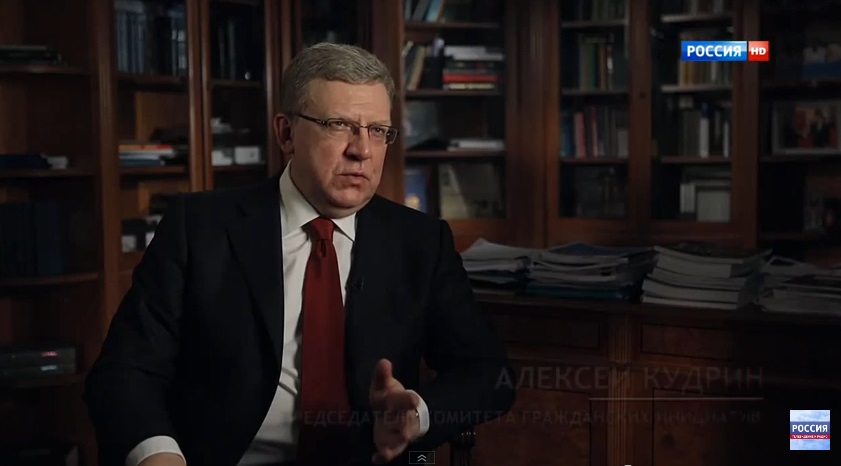
At 1:53 he is even shown speaking at a demonstration in 2011 about the need for “a platform for dialogue” to avoid the violence of revolution, with the late opposition leader Boris Nemtsov right across from him — but Nemtsov is not mentioned in the film.
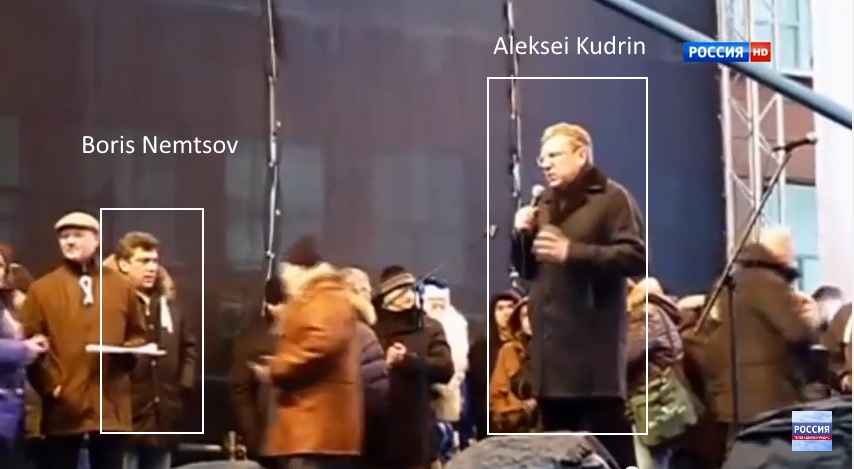
Putin also lashes out against the West in this film, and accuses the US of deliberately supporting terrorists and even meeting with Chechen militants in order to undermine Russia’s government.
RIA Novosti quoted Putin as follows
“Once our intelligence agencies discovered actually direct contacts between militants from the North Caucasus and representatives of United States intelligence in Azerbaijan. They actually really helped them, even with transport. And when I told the then-president of the United States about this, he replied, “Well, I’ll…’ I beg your pardon, but I will say it frankly: “I will kick their behinds.”
Putin also said that a few days after this call, FSB directors received a letter from the directors of American intelligence in which they declared their right to support opposition forces in Russia. The president also announced that he warned the leaders of the West about possible consequences of the support of terrorists:
“Someone considered, evidently there, especially the intelligence of Western countries that if someone acts to shake the main geopolitical rival, and as we now understand, Russia has already remained such in their mind, on the whole this is to the good. But it turns out that’s not the case,’ added Putin.
Putin didn’t give the name of the president, but it may have been George W. Bush, after the terrorist attack on the US on September 11, 2001, when Russian prevailed on the US to include the Caucasus Emirate in the US list of terrorist groups.
There is no evidence that the US supported Chechen terrorists for the sake of destabilizing Russia. And for Moscow, there’s no distinction between figures responsible for terrorist acts, and the elected Chechen government of Aslan Maskhadov, recognized after elections by OSCE and the Yelstin government, but later repudiated under Putin.
By merging the stories about alleged contacts with militants and then a letter using the word “opposition,” Putin conflates the armed and terrorist resistance to the Russian government with the peaceful opposition with US government officials and members of Congress meet with openly.
Putin also makes a categorical statement about never using terrorists that seems oblivious to the known facts of Russian infiltration and exploitation of terrorist groups, which was quoted by AFP in the movie:
“Absolutely not, never and nowhere. You mustn’t even try to use terrorists to solve transitory political and even geopolitical tasks.
“Because if you support them in one place, they will raise their head in another place and they will definitely strike those who supported them yesterday.”
Yet Russia was happy to use the services of Shamil Basayev, one of the most notorious of the Chechen terrorist leaders, when he fought on the side of Russia during the war in Abkhazia, a territory one belonging to Georgia now under Russian control. While this war occurred before Putin came to power, he pursued the same policy, bringing South Ossetia and Abkhazia into Russia’s orbit.
Some would argue that the deployment of Col. Igor Strelkov (Girkin), who once served as an FSB agent in Chechnya and who later bragged about summary executions in Slavyansk, would also fall into this category. Russia has also been called out for its lack of cooperation in informing the US about Tamerlan Tsarnayev, who spent months in Dagestan, reportedly meeting with jihadists, some of whom were later assassinated by Russian forces.
As for the issue of the US contact or even support of Russian opposition, the RT.com operation, which exiled opposition leader Ilya Ponomarev has aptly called a latter-day “Comintern,” mainly focuses on opponents of the US such as WikiLeaks Julian Assange who had his own talk show on RT.com and a wide assortment of conspiracy theorists, extremists, hackers and anarchists who would be in jail merely for holding up a poster if they were in Russia.
As James Kirchick noted on a recent talk show at Hromadske TV, RT.com doesn’t even propagandize Russia or the glories of the president so much a broadcast negative material about the West, mixing in conspiracy theories and disinformation.
The film, produced by popular pro-government TV host Vladimir Solovyov and directed by Saida Medvedeva is mainly a contrived, selective hagiography, with predictable scenes of Putin patting the heads of little children during disasters
But along the way, there are a few telling scenes, such as footage of a shaken Sergei Stepashin, who briefly served as FSB director and as prime minister, speaking at a government meeting just after returning from Dagestan following Basayev’s invasion in 1999. He decides to stand rather than sit to deliver his report: “I fear we have already lost Dagestan.”
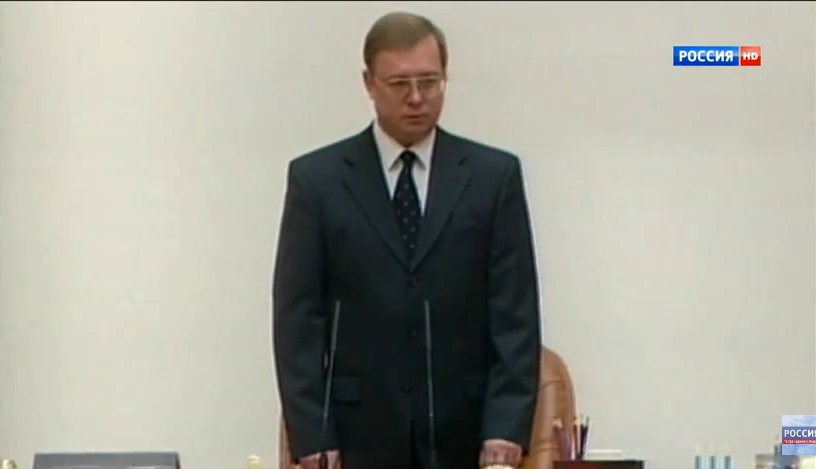
Sergei Stepashin
He then stoically announces that President Yeltsin has decreed his resignation and replaced him with a man he describes as “decent and worthy”: Vladimir Putin.
(Note: The Interpreter is a project of the Institute of Modern Russia, funded by Pavel Khodorkovsky, the son of Mikhail Khodorkovsky.)
— Catherine A. Fitzpatrick
In October both the State Department and the White House were penetrated by a successful hacking attempt, gaining access to sensitive, though apparently not classified, information.
New revelations, published by the New York Times, suggest that the emails of some officials who regularly communicated with President Barack Obama were among those compromised by the hack, meaning that hackers had the ability to see some emails sent to and from the American President.
The fact that Mr. Obama’s communications were among those hit by the hackers — who are presumed to be linked to the Russian government, if not working for it — has been one of the most closely held findings of the inquiry. Senior White House officials have known for months about the depth of the intrusion.
“This has been one of the most sophisticated actors we’ve seen,” said one senior American official briefed on the investigation.
Others confirmed that the White House intrusion was viewed as so serious that officials met on a nearly daily basis for several weeks after it was discovered. “It’s the Russian angle to this that’s particularly worrisome,” another senior official said.
— James Miller
A break in the Druzhba pipeline running from Russia through Belarus to Europe has led to a halving of the oil supply, Forbes Russia and RT.com reported.
Kommersant tweeted that Belarus had said it would finish the repair work by 15:00 Moscow time.
The accident took place Sunday night, April 26 near the town of
Babovichi in Belarus, where there is an oil-pumping station on the
pipeline, said Igor Dyomin, advisor to the president of Transneft and
the press secretary of the company.
He said the delivery was cut in half.
The accident
occurs on the eve of the 70th anniversary of Victory Day in World War
II, which many West European leaders are not attending out of an
expression of disapproval for Putin’s ongoing war in Ukraine. Western
sanctions have been put in place over the annexation of Ukraine and
continuing war despite the peace talks in Minsk.
The incident highlights the dependence of Europe on Russia for oil and gas.
The head of Transneft, Nikolai Tokarev, 64, recently had his contract extended another five years.
– Catherine A. Fitzpatrick
Andrei Zhilin, a spokesman for the Russian-backed militants in southeastern Ukraine often described as a “military expert” reports that Igor Plotnitsky, the head of the self-proclaimed “Lugansk People’s Republic” has been arrested in Moscow, charter97.org reported, citing Chetvyortaya Vlast‘ (Fourth Estate).
Both these regional sources cited Zhilin’s own Facebook page but the link just goes to his whole page. We found a post made 22 hours ago where he said he had a report of Plotnitsky’s arrest by “our guys” and that, “He was taken for an encounter with the traitors in St. Petersburg.” This is a reference to a Russian police practice where a suspect is brought to face his accusers before trial. Then later in the comments, he said he had confirmed it.
He added that he hadn’t gotten the story merely from the Internet, but worked directly in person with the sources. One reader said there were rumors that Plotnitsky’s guard had been arrested for disorderly conduct in a cafe.
But others said Plotnitsky had merely gone for consultations to Moscow, and putnik1, a pro-Russian blogger said that while he was not arrested, he may be removed from his post soon.
The Interpreter has a translation:
Regarding the rumors of events in Lugansk.
a) The rumors about the arrest of the head of the LNR do not correspond to reality.
b) But the head of the LNR in reality went for talks to the territory of one of the adjacent states. The likelihood of return to performance of his duties is very high.
c) The reason for the invitation, with the maximum likelihood, was various types of negative realities in the LNR which had provoked the just reproaches of the citizens of the young Republic.
d) And also there is possibly news about a threat to the life of the LNR leader.
e) Along with the head of the LNR — apparently, unhappily — two quite high-ranking officials traveled with him, apparently who have the main responsibility for the negative phenomenon.
The blogger added that there had been a lot of negative talk about Plotnitsky on social media recently due to the deterioration of living standards in the LNR and complaints of the theft of humanitarian aid.
Chetvortaya Vlast, a web site exposing corruption, had a story April 15 accusing the FSB and Plotnitsky colluding in the theft of humanitarian aid.
A group of fighters in the Odessa Separate Spetsnaz Brigade in the LNR had sent documentation of the theft and re-sale of Russian humanitarian aid to Nikolai Kovalev, a deputy of the Russian State Duma, which he sent to Andrei Yevdokimov, editor of the journal Zashchita i bezopasnost [Defense and Security]. Later the five were reportedly arrested by Plotnitsky’s men.
Screenshots of the memo to Kovalev accompanied the article.
— Catherine A. Fitzpatrick
Moscow’s Dom Knigi (House of Books) has removed from its shelves Maus: A Survivor’s Tale, the famous 1972 graphic novel about the Holocaust by Art Spiegelman.
Store clerks said it was because the cover had a picture of a swastika, Ekho Mosky reports.
The work is a post-modern novel with comic-like drawings showing the Jews as mice and the Nazis as cats.
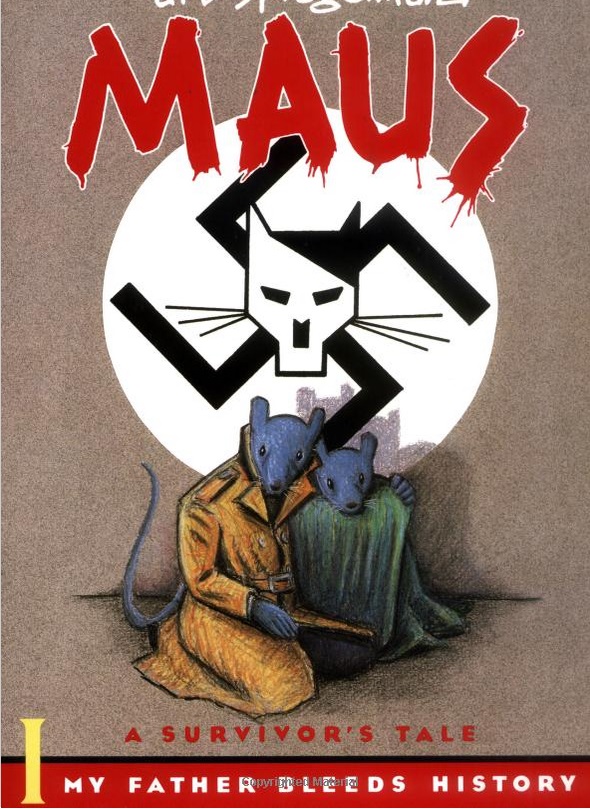
The swastikas are shown in the context of telling the story of Spiegelman’s father, Vladek, who was as a survivor of the Holocaust.
The Russian translation, published by Corpus, came out only in 2013, says TV Rain. It was named among the best books of the year in Russia by GQ.
The book is being removed in the context of a sweep of stores to remove anything offensive before the 70th anniversary of Victory Day on May 9. Several weeks ago there was a scandal when a display at Detsky Mir (Children’s World) on Lyubanka Square, headquarters of the Federal Security Service (FSB) was found to have a souvenir bust of an SS soldier.
— Catherine A. Fitzpatrick
Preparatory work is under way to build a bridge across the Kerch Strait separating Russian-occupied Crimea from the Russian mainland. The general contractor was already selected last year — Arkady Rotenberg’s Stroygasmontazh — but the sub-contractors are still up in the air.
Stroytransgaz (STG) Holding, the oil and gas engineering company owned by Gennady Timchenko, is completing a sale of his entire portfolio of 25% of the shares in ARKS, a construction company registered in Singapore, to the rest of the owners of the company, Vedomosti reports.
In an article titled “Will Gennady Timchenko Build the Kerch Bridge?,” Vedomosti reports that ARKS founder Aleksandr Lavlentsev will buy Timchenko’s shares, citing an unnamed source.
The deal is a continuation of the restructuring of the construction shares of STG Holding, says a person close to the shareholders; 25% of the shares of SK Most were also sold to another shareholder. Says Vedomosti:
Stroytransgas is the general contractor and Most the sub-contractor of a project to build a bridge across the Kerch Strait to link Russian-occupied Crimea with Russia.
But Stroytransgas was frightened off from the general contractor risks, and Arkady Rotenberg;’s Stroygasmontazh became the general contractor.
Yet Timchenko’s participation in the construction of the bridge over the Kerch Straits is still being discussed even now, says a person close to the Ministry of Transportation, and a person close to the company working on the project. Now it’s a question of the sub-contractors: ARKS may take on part of the work itself — first of all, the access roads.
But another source close to the company said ARKS would not take on the construction.
Most does not have enough capacity, an ARKS is just in the process of freeing itself from major road sub-contracts in the Moscow Region, continued the person close to one of the companies in the Kerch projects; the question was discussed how to reduce to a minimum the connection between ARKS and Timchenko. Among the options is a structure that legally would not be connected to Timchenko but would use his equipment, personnel and management.
Both Timchenko and Rotenberg are in the lists of persons sanctioned by the US and EU for their role in the forcible annexation of the Crimea last year.
The Kerch Bridge project is estimated to be the ruble equivalent currently of about $4.5 billion. During World War II, the Germans attempted to build a bridge across the straight but then the Soviets attacked them and they blew it up as they retreated. In 2010, then president Dmitry Medvedev made an agreement with then president Viktor Yanukovych to build the bridge but it never got to the feasibility study stage before the annexation.
There are many challenges in trying to build a bridge at least 4.5 kilometers long and 6-0 meters high, given the need to allow ships to pass underneath, and the deep water with strong currents.
In December 2014, TASS quoted Timchenko as saying that he would not take on the bridge for fear of reputational risk:
“It’s not clear what the cost is — there is no proposal. It’s not clear what kind of geology is there. Therefore it is a very risky story. Therefore I simply am afraid of taking it on and not coping.”
Arkady Rotenberg then stepped in and the contract of $3 billion was awarded to his Stroygasmontazh (SGM) Group. On March 26, RBC.ru reported that Rotenberg had created a subsidiary company, SGB Most, to perform the job and appointed Aleksandr Ostrovsky to head up the project. Ostrovsky comes from Mostotrest, a company given Sochi Olympics contracts whose largest shareholder is Igor Rotenberg, Arkady’s son.
Vedomosti’s story that some entity that “legally would not be connected to Timchenko but would use his equipment, personnel and management” and that his role is still being discussed even after he has sold his shares means some sort of matryoshka-doll arrangement could be in the works.
Since the occupation, there have been major traffic jams as thousands of vehicles including many delivery trucks get in line every day to try to cross the strait, but find sometimes the ferries aren’t runny because the water is too choppy, or there isn’t enough room on all of those operating.
Arkady Rotenberg and his brother Boris, childhood friends of President Vladimir Putin and long-time supporters, received approximately $7 billion in contracts for the Sochi Olympics, a fact noted by the late Boris Nemtsov in his expose of the fabulous costs of the Games, three times as expensive as any other in history.
— Catherine A. Fitzpatrick